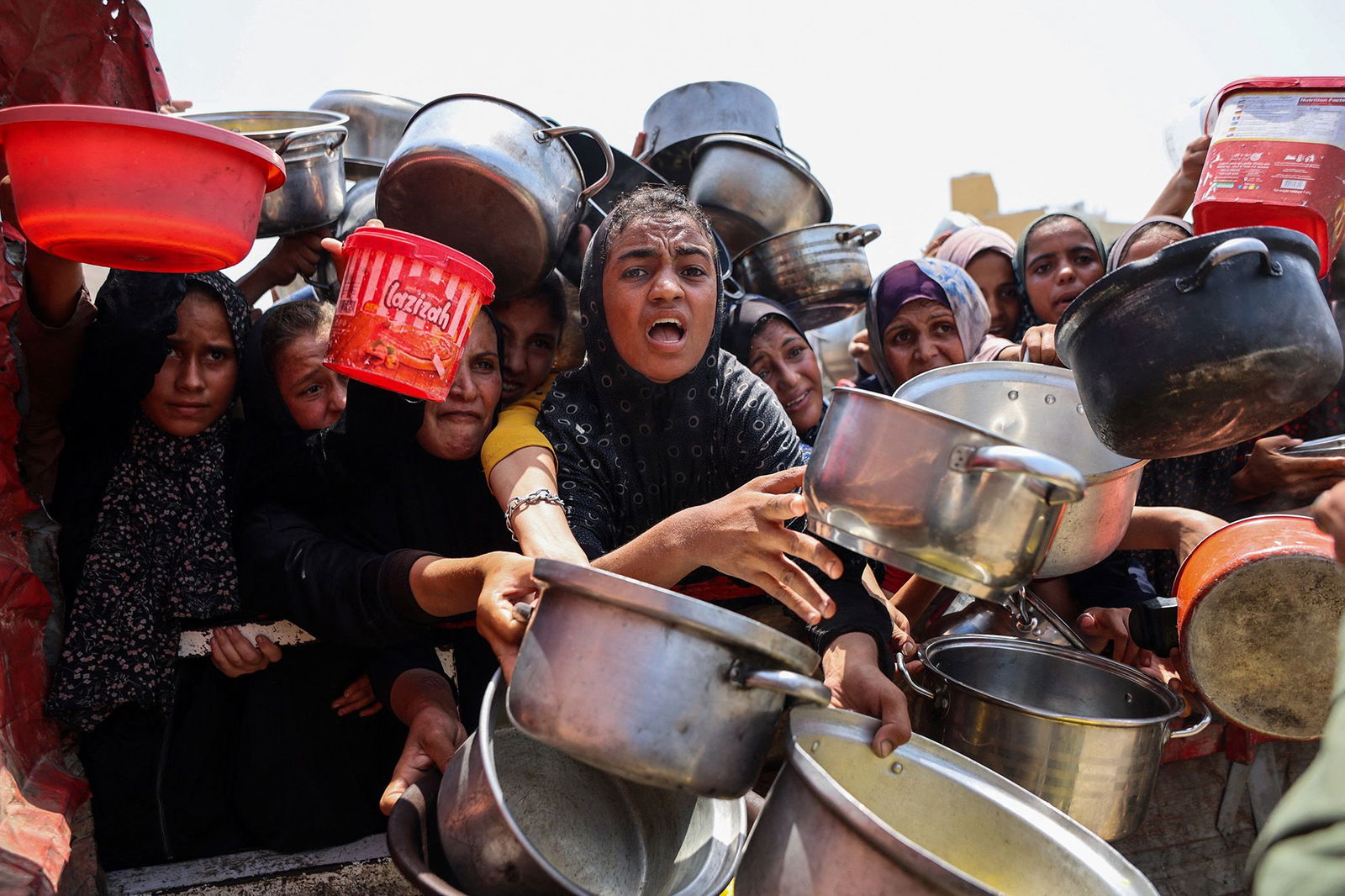Gaza City suffering a ‘man-made’ famine that’s likely to spread, UN-backed initiative says

Palestinians gather to receive cooked meals from a food distribution center in Gaza City on August 13
By Nadeen Ebrahim, Eugenia Yosef, Oren Liebermann, CNN
(CNN) — Parts of Gaza are officially experiencing a “man-made” famine, according to a Friday report by a United Nations-backed initiative, which added that the situation is expected to worsen after months of relentless conflict.
The Integrated Food Security Phase Classification (IPC) reported that famine has been confirmed in the Gaza Governorate, which includes Gaza City, now also the site of a major new Israeli offensive.
“As this Famine is entirely man-made, it can be halted and reversed,” the report said. “The time for debate and hesitation has passed, starvation is present and is rapidly spreading. There should be no doubt in anyone’s mind that an immediate, at-scale response is needed.”
The report called for an immediate ceasefire, saying that without a truce that allows humanitarian aid to reach everyone in the Gaza Strip, “avoidable deaths will increase exponentially.”
During nearly two years of war in Gaza, Israel has at times restricted or cut off the entry of aid to the ravaged enclave.
While some people have died of starvation and hunger, others have been killed trying to receive aid at distribution sites run by the controversial US- and Israeli-backed Gaza Humanitarian Foundation (GHF), which was brought in place to replace a UN system long criticized by Israel.
The Coordination of Government Activities in the Territories (COGAT), the Israeli agency tasked with distributing aid into Gaza, rejected the IPC report ahead of its release, saying it “relies on partial, biased data and superficial information originating from Hamas.”
COGAT said that the IPC’s “one-sided approach completely disregards the extensive humanitarian efforts undertaken in Gaza,” adding that the report ignored information provided to its authors by Israel.
It also stated that in terms of aid the “overall trend has shifted” in Gaza, but that Hamas has continued to exploit humanitarian supplies.
Aid groups, the UN and harrowing testimony and images emerging from Gaza have, however, painted a different picture.
US President Donald Trump last month said there is “real starvation” in Gaza, contradicting statements by Israeli Prime Minister Benjamin Netanyahu, who has said that no one is starving in the territory.
UN Secretary-General António Guterres said the famine reported in Gaza is “a man-made disaster, a moral indictment, and a failure of humanity itself.”
“As the occupying power, Israel has unequivocal obligations under international law – including the duty of ensuring food and medical supplies of the population,” Guterres added. “We cannot allow this situation to continue with impunity. No more excuses.”
Tom Fletcher, the UN emergency relief coordinator, urged the world to read the IPC report “from cover to cover.”
“Read it in sorrow and anger, not as words and numbers but names and lives. Be in no doubt that this irrefutable testimony. It is a famine, the Gaza famine. The famine that we could have prevented if we were allowed. Yet food stacks up at borders because of systematic obstruction by Israel,” Fletcher said Friday at a news briefing.
CNN, along with other media outlets, has widely reported on hunger and starvation in Gaza.
Last month, CNN reported the death of 4-year-old Razan Abu Zaher, who died at a hospital in central Gaza from complications brought on by malnutrition, according to a medical source. Her skeletal body was laid out on a slab of stone.
Two more deaths due to starvation were recorded Thursday by the Palestinian health ministry, bringing the total number of those who died of malnutrition to 271, including 112 children.
Friday’s IPC report added that “malnutrition threatens the lives of 132,000 children under five through June 2026, including 41,000 severe cases, doubling May’s numbers.”
Formal famine determinations are rare. The IPC has previously determined famines in Somalia in 2011, South Sudan in 2017 and 2020, and parts of Sudan’s western Darfur region last year.
This is the first time the IPC has confirmed famine in the Middle East.
Under the IPC system – a five-phase scale used to measure the severity of food insecurity – a famine can only be declared if data shows certain thresholds are met.
Those conditions are: at least 20% of all households must face an extreme food shortage, 30% or more of children must be acutely malnourished or 15% of children suffering from acute malnutrition based on body measurements, and at least 2 in every 10,000 people die every day because of outright starvation or the interaction of malnutrition and disease.
CNN’s Niamh Kennedy contributed reporting.
The-CNN-Wire
™ & © 2025 Cable News Network, Inc., a Warner Bros. Discovery Company. All rights reserved.
This is a breaking news story and will be updated.



